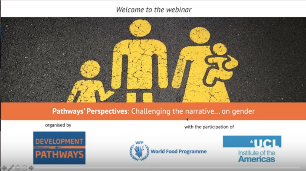« back
Webinar on Gender and Social Protection: Challening the narrative... on gender
 April 2020 / Estelle Gagbenin, Academic Trainee, Quality Assurance and Poverty Reduction Section, Swiss Agency for Development and Cooperation (SDC)
April 2020 / Estelle Gagbenin, Academic Trainee, Quality Assurance and Poverty Reduction Section, Swiss Agency for Development and Cooperation (SDC)
 As part of International Women's Day 2020, Development Pathways organised a webinar to challenge the assumptions underlying policy narratives and discourses that stereotype men and women in social protection. Two experts, Professor Maxine Molyneux from the Institute of the Americas, University College London and Juan Gonzalo Jaramillo Mejia from World Food Programme shared their views and experiences on the prevalent assumptions that perpetuate "gender myths" in social protection and social policy. They also highlighted entry points and leads on how to break these stereotypes of the policy discourses.
As part of International Women's Day 2020, Development Pathways organised a webinar to challenge the assumptions underlying policy narratives and discourses that stereotype men and women in social protection. Two experts, Professor Maxine Molyneux from the Institute of the Americas, University College London and Juan Gonzalo Jaramillo Mejia from World Food Programme shared their views and experiences on the prevalent assumptions that perpetuate "gender myths" in social protection and social policy. They also highlighted entry points and leads on how to break these stereotypes of the policy discourses.
The main assumptions considered in this webinar were the following:
- Cash empowers women
- Our programme is gender aware
- We are targeting women
- Women are at the frontline of poverty reduction
- Social protection programs compensate for care-giving work
- A child's well-being depends heavily on the mother's well-being
With two central points of those assumptions:
- By meeting women's needs, my programme is advancing gender equality
- Social protection is not a gendered strategy – it is a poverty reduction strategy
Why do those underlying assumptions need to be challenged? The response is straightforward: if we want to achieve equality in gender and development, the main narratives must be changed as they impact the design and focus of programmes in social protection.
Do social protection programmes indeed advance gender equality – do they have a transformative impact?
In many cases, the response is unfortunately negative. As reflected by the assumptions, social protection is usually not seen as a strategy to promote gender equality, but as a strategy for poverty reduction. What is the issue with that focus and narrative? By maintaining the underlying assumptions, the programmes do not question the existing division of labour and the overall social structures with some of the following consequences:
- Gender roles and norms are reinforced
- Most of the responsibilities of care work (as seen in the conditionality of some programmes ) are put on the women's shoulders
- Programmes are consequently putting women at the service of social protection and not on the other way.
The two experts also presented some entry points and leads on how to make social protection programmes more transformative and gender aware:
- conduct a gender analysis that look at the gender relations in the given societies and apply a gender lens in the overall design of the project;
- how to change the use of conditionality that usually burdens the women (by for instance removing completely the use of conditionality or including the man as person in charge of fulfilling the conditions);
- the crucial importance of involving men (and the many ways of having them on board) and;
- the issue of intersectionality and the recognitions of double/triple burdens: listening to the people and their specific needs is crucial in order to comprehend the role and adequacy of the transfer in connection to other services (the case of disabled women was discussed).
The experts and the participants tackled many other issues, assumptions and entry points. Consequently, we hope that this short overview of the webinar will make you want to follow the webinar by yourself, which is available here:
